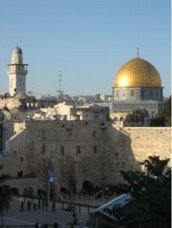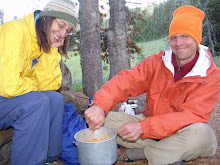One final email update from my trip this summer. This is a month late
because it took me a bit longer than I expected to re-acclimate. You
might say I suffered from the cultural "bends." I was pretty
thoroughly in the dumps for the first two weeks, trying to reconcile
what I'd experienced there with daily life here. I've been working
hard to recover my basic U.S. life skills: getting annoyed by slow
traffic, keeping up with the latest Hollywood and/or Washington
gossip, and navigating my way around a gargantuan box store. (Of
course, I've been trying to catch up with the Harry Potter craze as
well, but that's been relatively easy to do.)
The most difficult thing, hands down, has been the news. The
information we receive about Israel and Palestine here in the U.S.
typically doesn't line up with what I saw first-hand. Just this week
have I been able to start reading newspapers and listening to radio
again; I still can't bear to watch TV reports.
I think it'll be easiest to sum it all up in a FAQ session with the
most common questions I've heard thus far:
Q: Did you indeed arrive home safely, and are you still alive? (This
question usually comes from relatives whom I forgot to call upon
arrival.)
A: Yes, and I'm sorry I didn't call sooner.
Q: What is the difference between what we hear and what's happening in
the West Bank?
A: I think the biggest difference is in our basic assumptions about
the conflict. As I thought about my trip, I realized that I, like
most media reports I read, have always operated under at least two
assumptions: 1) On a daily basis, the two sides have something like a
Cold War, staring tensely at one another until a suicide bomber messes
things up and they have to start all over. 2) The cause of the
ongoing conflict is basically hatred and anger – either from religious
differences or from previous injuries and losses – maybe like the
Hatfields and McCoys. They need to reconcile and forgive one another!
That's probably the most important discovery of my trip: these
assumptions are wrong. First of all, there is no Cold-War-like
standoff between two sides. The Israeli government has all the
financial and military power in the West Bank, and is using that power
to actively exploit the Palestinian people. Land is actively being
confiscated, settlements are rapidly expanding, homes are being
bulldozed daily, business is being strangled through checkpoints and
other clever methods, the barrier is cutting people off from their
lands, jobs, hospitals, and families, and so on. Suicide bombs make
the papers because they're spectacular and horrible; what you don't
see in the papers is the daily violence being exerted upon the
Palestinians by the Israeli government and the settlers.
Secondly, while there is a need for forgiveness and reconciliation,
the extreme imbalance of power must be addressed. As one Christian
Palestinian stated to us at his conflict resolution center in
Bethlehem, "Those peace groups where Israelis and Palestinians get
together and shake hands are fine, but they usually avoid talking
about the real problems of equal rights and the abuses of power. I
want to shake hands with the Israeli as my brother, not have him
patting me politely on the shoulder like a child."
Q: What are the main political issues in the conflict?
A: Here are two big ones. First, refugees. Over 750,000 Palestinians
fled or were driven out of their homes during the wars of 1948 and
1967. Now there are millions, living in Lebanon, Jordan, Syria, the
West Bank, and other places. According to the Geneva Conventions,
refugees must be allowed to return after the conflict is over.
However, if Israel allows them to return, Arabs will outnumber Jews.
Israel will then have to decide whether they want to be a "Jewish
State" or a democracy. (This will be a problem down the road even
without the refugees. No modern state can successfully be a democracy
and grant preferential status to a particular religion – it doesn't
work for Islamic states, Buddhist states, or Jewish states.)
Second, settlements. It is also illegal according to the Geneva
Conventions to build in occupied territory and place your own
population there. The settlements in occupied territory have grown
rapidly since 2000, and now effectively divide up the West Bank. If
Israel withdraws from the West Bank, what to do with all this
infrastructure? The plan seems to be that these "facts on the ground"
will get to stay under Israeli control in an eventual two-state
solution, giving them strategic locations that control water sources
and trade routes. As foreign minister in 1998, Ariel Sharon said as
much on the radio: "Everyone should take action, should run, should
grab more hills. We'll expand the area. Whatever is seized will be
ours. Whatever isn't seized will end up in their hands."
(http://www.cbc.ca/world/story/1998/11/16/israel981116.html)
Q: Your trip seems to sympathize only with the Palestinians. Didn't
you get the Israeli side?
A: Well, two of the human rights organizations we met with were made
up entirely of Israelis; B'T'Selem and ICAHD. We also spoke with an
Israeli woman who lives with her family in a settlement who was by no
means sympathetic toward the Palestinian cause. I had the chance to
visit the Holocaust museum and Masada, and to read a lot of the
literature from the Israeli government and from the conservative news
sources that support the government policies. These Israeli
perspectives were all very helpful to hear as I tried to make sense of
the conflict.
However, I don't see this as a "support Palestinians or support
Israel" issue. It's not about Judaism or Islam or Christianity, nor
is it about the "good guys" and the "bad guys." This is about justice
versus injustice, and there are policies of extreme injustice being
enacted by the Israeli government, which most Palestinians and some
Israelis are bravely standing up against. I've heard three standard
justifications in support of these policies, which could be taken
directly from apartheid, Jim Crow laws, or just about any other
situation of oppression: "it's necessary for security," "God is on our
side," or "punishment will teach them to behave." If you know of
people who have other arguments to support Israel's policies in the
West Bank, I would be very interested to hear them.
Q: What about the Islamic theocracies and their policies of injustice?
A: Excellent point. Any system of injustice should be opposed. Of
course, this is the only one that's currently getting $3billion per
year from our government.
Q: What is the solution going to be?
A: After traveling there and studying and learning, I can say with the
utmost confidence that I have no idea. Some Palestinian groups said
that there are now so many settlements that a two-state solution isn't
valid anymore. Israel just needs to give everyone in the occupied
territories the same rights as Israeli citizens, including the right
to vote. Others say a two-state solution is the only way they'll have
any freedom. One-state, two-state, they can figure that out. That's
none of my business. The last thing they need is another westerner
like me coming in and giving them MY solution. If a solution will
work, there must be a process where both parties can come to the table
with equal weight, and someone can hold each side accountable for
their agreements. During the Oslo peace process, house demolitions
increased and settlements doubled, even though Israel agreed to stop
these activities "in good faith." My friend described the past peace
negotiations as two people arguing over a slice of pizza, while one
person is eating the slice of pizza.
Q: What seems to be the biggest impediment to peace right now?
A: I think there is a lack of accountability for Israel living up to
its self-image as a "light to the nations." There are divisions
within the Palestinians, to be sure, but the constant violence of the
occupation is tearing down Palestinian civil society, creating massive
unemployment, removing people from their lands, and thereby making
those divisions more likely and more violent. Any hope for peace will
require the occupying force to treat all of its citizens and all of
the West Bank residents with equal rights, whether they are Christian,
Muslim, or Jew. The current policies allow for violence and
exploitation of non-Jews, and there is no accountability for these
actions. That is why I support the BDS campaign (Boycott, Divest,
Sanctions), to call the world's attention to the daily violence in the
West Bank. Realistically, it won't make a big difference financially.
There are powerful lobbies in the U.S. to ensure Israel continues to
receive $3billion annually from our government, both the arms
manufacturing lobby and the pro-Israel Jewish lobby, but maybe the bad
press will make a difference. It seemed to help in South Africa's
struggle to end apartheid, and this situation is every bit as racist
and unjust.
I have confidence that the truth will eventually out. In thirty or
forty years, nobody but the most die-hard religious zealot will admit
to having supported these policies, and this occupation will be over.
That's my hope anyway.
Wow, that was longer than I'd expected. So much for trying to be
succinct – thanks for following along this far! I find that it's very
helpful for me to speak about the experience with other people,
especially those who have a different view of the conflict. I've
already had the chance to talk about it with the local Friends Meeting
and a number of small group gatherings, and in the next couple of
months I'll get to speak at Utah Valley State University, the First
Baptist Sunday School, the Interfaith Roundtable, and the Presbyterian
Church back home in NC, and maybe some other places, too. If you know
of any groups or individuals that might have an interest in talking
with me about this experience, let me know! Like I said, it feels
good to discuss it, and it helps me to write about it. After reading
this email, you could probably bill my insurance for mental health
counseling.
Thanks again for everyone's support!
God's Peace to you,
Andy
PS - If you'd like to see a good article about Hebron, here's one that
just came up in the Washington Post. I bought Christmas presents for
my brother and sister from Jamal, the guy in the picture. He had some
great stuff.
http://www.washingtonpost.com/wp-dyn/content/article/2007/07/25/AR2007072502360.html?referrer=emailarticle







